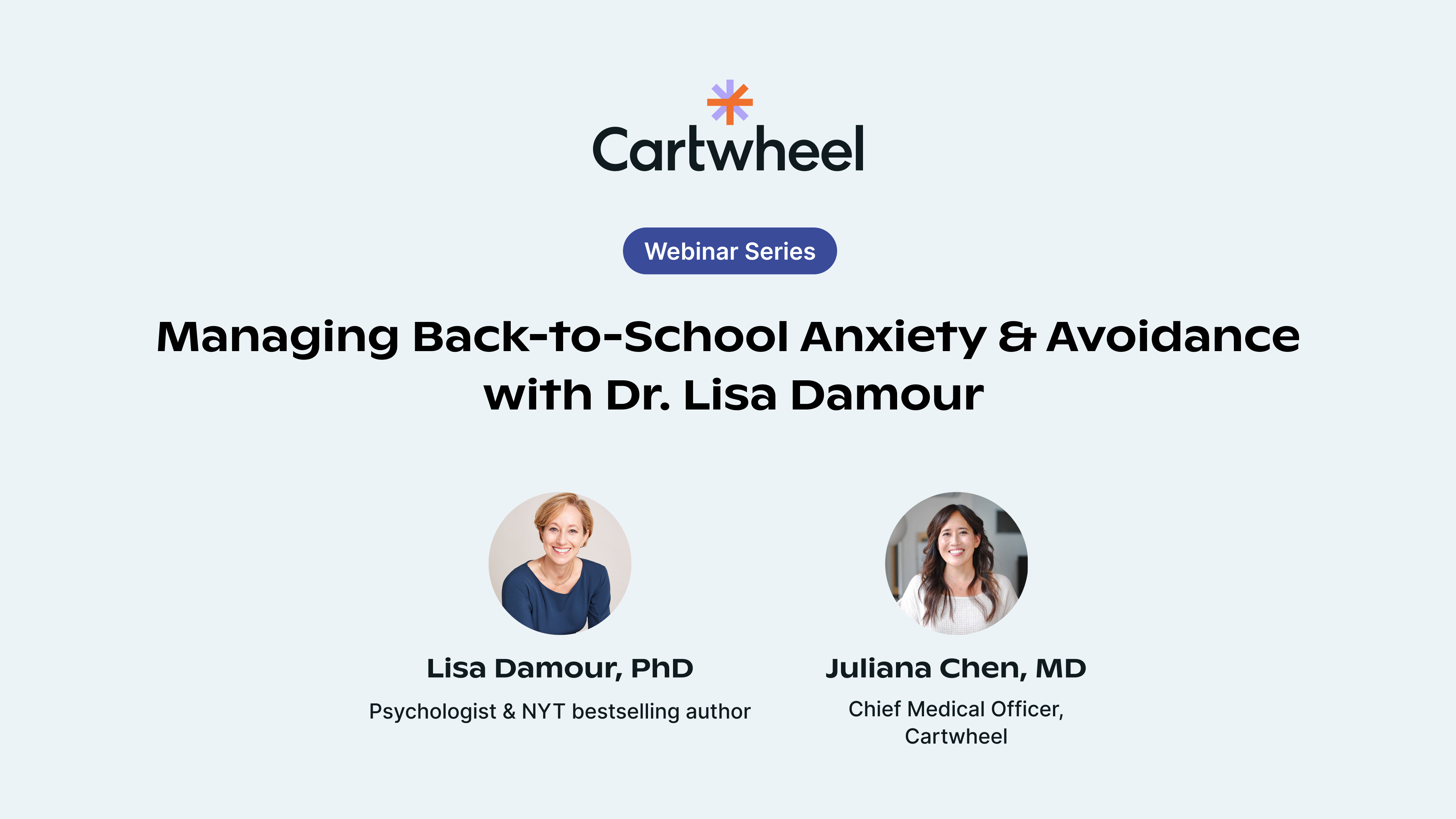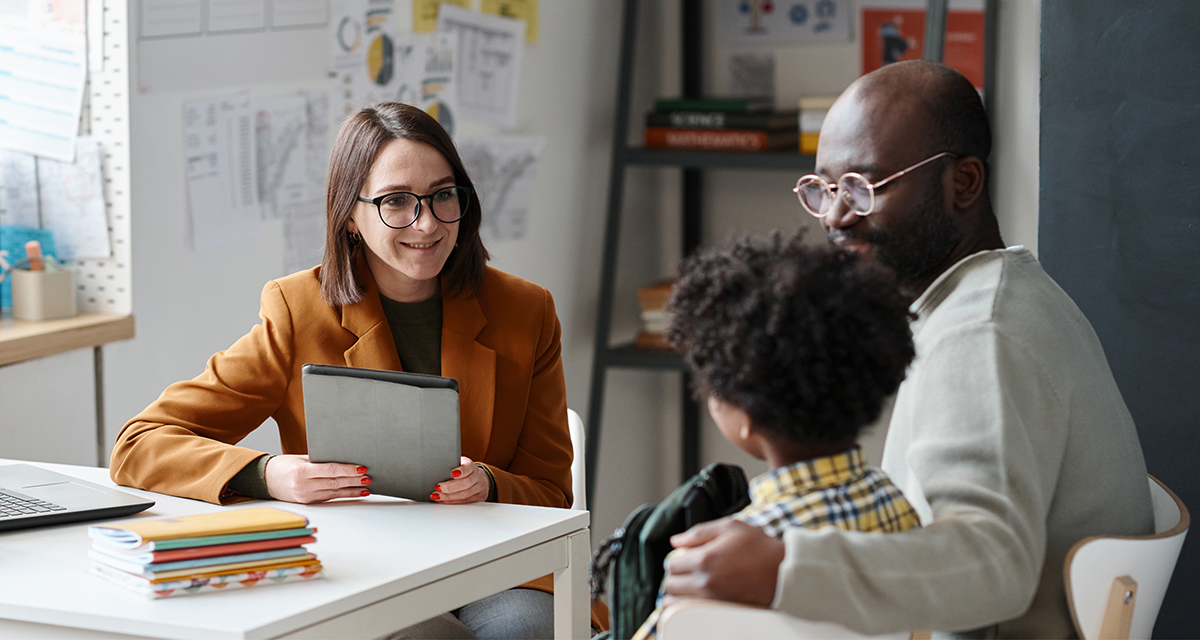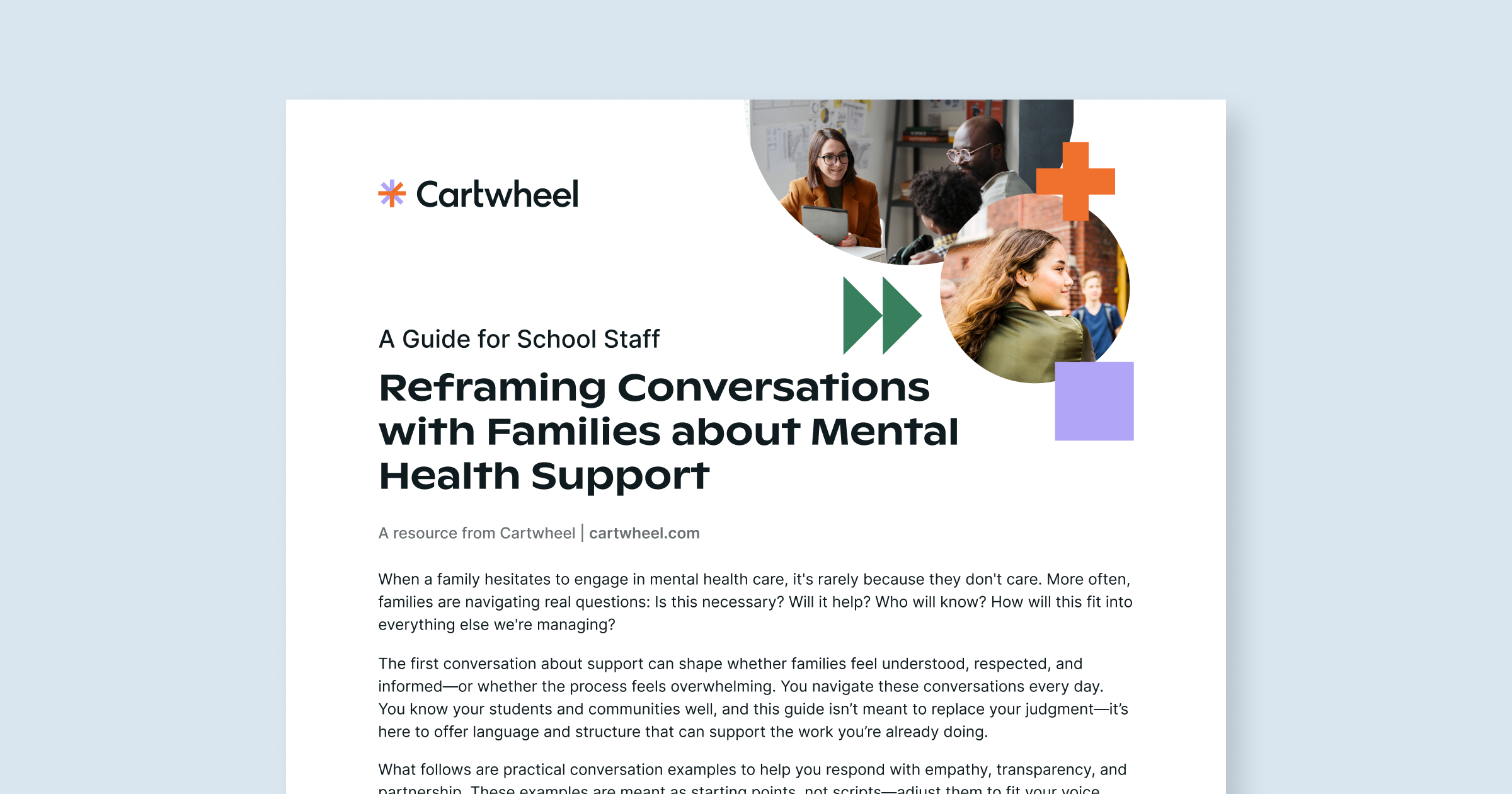Kids and teachers are heading back to school after summer break, but can be a hard transition. Here's what psychologist Dr. Lisa Damour wants you to know: a little anxiety is a sign that everything is working exactly as it should.
In our recent webinar, Dr. Damour—NYT bestselling author and the anxiety consultant on Pixar’s Inside Out 2—spoke with Cartwheel’s Chief Medical Officer, Dr. Juliana Chen, about some perspective-shifting insights about supporting teen mental health during the back-to-school transition.
Wait, What? Anxiety is a Good Thing?
While popular culture tells us that uncomfortable emotions are bad, anxiety is a normal and healthy part of life, Dr. Damour shared. What kids need to know is that a lot of their anxieties are temporary.
“Anxiety is part of how we prepare for uncertainty; it's how we get ourselves ready for situations where we don't know exactly what's gonna happen,” she said. There’s this idea that we’re supposed to feel good, and anything short of that is grounds for concern. But that’s just not the case. “Anxiety, especially as the school year is starting, is to be expected and a sign that your kid cares and is paying attention.”
So when your student or child comes to you worried about the new school year, try responding with something like: "Of course you're anxious! There are a lot of unknowns right now. Once you get there and start figuring things out, most of these worries will probably fade." This simple reframe can be incredibly relieving for a young person who's been told their anxiety is something to be fixed.
“The bottom line here is anything we can dream up is (almost always) worse than the reality,” Dr. Damour shared. Going to school, talking to the teacher, taking the test … most of the time, kids will push through it and then feel reassured because they actually do know what to do.
Unhealthy Anxiety Looks Like School Avoidance
The biggest red flag is when kids start avoiding the things that make them anxious. What we want to watch out for, she shared, is when anxiety becomes the dominating emotion. “There's healthy anxiety, which helps us get ready for new things. Then there's unhealthy anxiety, which starts to get in the way of our lives.”
The number one way this shows up is school avoidance. Rates of chronic absenteeism are way higher than they were before the pandemic, and they've stayed high, she shared. When kids are feeling anxious, they’re going to want to avoid the situation, and it’s our job as adults not to allow this.
At first, the relief of not going to school feels so good that anxious kids and teens may want to avoid it again the next time. But then our kids never get to discover that their fears were probably worse than reality. Now, they're behind academically and socially, making school genuinely harder to face.
That doesn’t mean kids aren’t allowed to avoid anything (bungee jumping is not for everyone, for example), but explaining that avoidance can backfire is important. “Teens and tweens deserve explanations. We can’t just hand the information down anymore, we have to tell them how it works,” Dr. Damour shared.
“When I'm talking to kids, I’ll say that if you’re nervous about going to school, and then you don't go to school, you're gonna feel instantly better. It’s an incredible short-term solution. But that's a terrible long-term solution, because it sets you up for more anxiety down the line.”
The ‘Small Steps’ Approach
It’s hard to watch kids battle with uncomfortable emotions, Dr. Damour acknowledged, and while sometimes it might seem easier to let them stay home, she advises against it. “It's really important that we don't let kids use avoidance to manage anxiety, especially around school,” she shared.
Instead, she uses a ‘small steps’ approach. The goal is for kids to do as much as they can tolerate at the time. If they can't be there for the whole school day, can they get there for the morning? Even if they can't go to class, can they get to the building?
For educators, this might mean getting creative with anxious students. Can they start their day in the counselor's office? Attend just morning classes? The key is keeping them connected to school while they build up their tolerance for anxiety.
“Not that anyone has the time, but your kid is better off sitting in the parking lot of the school with you than sitting at home feeling comfortable about not having gone to school.”
In conjunction, we can teach kids easy ways to bring their anxiety under control. “There are so many amazing strategies for managing anxiety. I have a free downloadable bookmark about how breathing reduces anxiety. It lays out the biology … teenagers love to see this, and how it works.”
‘An Emotional Garbage Bag’
“I don't want us to worry about kids complaining about school,” Dr. Damour shared. “School gets the best of them, and we get the rest of them, right?” There’s a good chance that your kid is holding it together all day, and when they get home, the feelings tumble out.
Dr. Damour, who has two daughters, likens herself to an “emotional garbage bag” during the school year. When they come home she just lets them offload. “I have tried to offer guidance in these moments. It almost always fails.” They just want to dump out the garbage of their day, and it’s your job as a parent to let them. If your kid is still struggling, if you are unsure that just venting is enough, then you can say to them, ‘Do you want my help?’”
On the other end of the spectrum, of course, is the kid who comes in the door with a “fine” and a “nothing much.” Don’t take it personally, Dr. Damour says. School is not unlike a day of back-to-back meetings. Sometimes tweens and teens just don’t want to talk about it, and that’s ok.
The Importance of Recovery
Being a teenager is inherently stressful because change is stress-inducing, Dr. Damour shared. From a psychology standpoint, she’s even occasionally pro-stress, because it’s part of being human.
“The job of adults around young people is to basically stand between them and unhelpful cultural messaging suggesting that anxiety is bad and that stress is bad,” she shared. Sure, both can get out of control, but most of the time they’re actually operating at healthy levels.
As a first step, she recommends being matter of fact with kids: “Of course school is stressful, but that doesn’t mean it’s not good for you, or that it’s not working the way it should be.” It’s like training at the gym—if you’re only lifting the lightest weights, you’re never going to get stronger.
“Our goal is to get kids to see the strain of school in the same way. They will have more work than they are used to. They will have harder work than they are used to.”
To keep stress under control, Dr. Damour emphasises the importance of recovery. First up, kids need sleep, and lots of it. “Sleep is the glue that holds human beings together—it's the one universal recovery everybody needs to be focusing on.”
Coming in second is ensuring kids get real down time, not just endless scrolling. “You’ll see all this garbage that actually leaves you feeling worse, and you spend way more time [scrolling] than you even meant to, because these algorithms are so powerful.”
Instead, help your kids find enjoyable activities that offer emotional breaks from schoolwork, not just physical ones. “Guilt-soaked recovery is not real recovery.”
The Lens That Changes How You See ‘Bad’ Behavior
“Kids don't just misbehave for the heck of it. They are misbehaving to cope with whatever they are struggling with,” Dr. Damour shared.
This perspective shift is incredibly powerful because it moves us away from punishment-focused thinking toward solution-focused thinking. Instead of asking, "How do we stop this behavior?" we ask, "What need is this behavior trying to meet, and how can we help meet that need in a healthier way?"
For parents, this might mean looking at your child's concerning behavior and getting curious rather than angry. What are they trying to cope with? How can you help them develop better coping strategies?
For educators, this lens can transform how you approach classroom management. When you see a behavior that works at home but doesn't work at school, you can simply say, "In this building, when you need to handle that feeling, here's what we're going to ask you to try instead."
Our job is to be a steady presence for these kids, even if that means we have to fake it, Dr. Damour advises. Instead of reacting to bad behavior, we can try and figure out what purpose the coping is serving and react to that instead. “Teenagers will have a whole bunch of ups and downs. There's no getting around that. Reacting intensely to that won’t make it better,” Dr. Damour shared. “So it’s your job to take care of yourself, so you can take care of them.”
Caregivers and educators need sleep, too. They need time with their friends, exercise, and getting lost in a game or a film. Try and leave some space for “soft fascination”, Dr. Damour shares. By that she means leaving some bandwidth to think without distractions. “Soft fascination helps to reduce mental clutter, ease your mind, lets you solve problems, and it asks nothing of you. You don't have to add anything, it's actually a subtractive process.”
Building Bridges Between Home and School
“It’s hard not to worry,” Dr. Chen shared, but if caregivers and educators work together to support young people—and each other—navigating anxiety becomes a cycle of regulation, more than a hill to climb every morning.
“Development itself is challenging. When a ninth-grader seems disorganized and overwhelmed, that's not necessarily a sign that anyone is doing anything wrong. Ninth grade is inherently overwhelming! When third-graders suddenly become perfectionistic and hard on themselves, that's actually a normal developmental stage,” Dr. Chen shared.
As we settle into this new school year, remember that the goal isn't to eliminate stress and anxiety from young people's lives—it's to help them develop healthy ways to navigate the inevitable challenges of growing up.
Start by having conversations about normal back-to-school feelings. Let kids know that some anxiety and stress are not just okay, but actually signs that they're growing and challenging themselves appropriately.
- Focus on sleep—for both kids and adults. Everything else becomes more manageable when people are well-rested.
- Pay attention to coping strategies rather than stress levels. Teach and encourage healthy ways to manage difficult feelings.
- Tell it like it is. If it’s not going to be easy, frame it that way. Teens want to know details.
As Dr. Chen pointed out: “never worry alone.” Whether you're a parent concerned about your child or an educator working with a struggling student, reach out to others. Share your concerns, ask for input, and remember that supporting young people is always a team effort.
The start of a new school year will always bring challenges. But when we understand that these challenges are actually opportunities for growth, when we focus on building healthy coping skills rather than eliminating all discomfort, and when we work together as caring adults, we can help our students not just survive but truly thrive.
–
Cartwheel partners with PK-12 schools to provide comprehensive mental health services to students, families, and school staff. Learn more about our services including 1:1 teletherapy, parent guidance, family therapy, psychiatry, staff therapy, and our specialized school avoidance program. Families should visit: https://www.cartwheel.org/families to see if your school district partners with Cartwheel to provide these evidence-based support services.
–
Additional Resources
Ask Lisa: The Psychology of Raising Tweens & Teens Podcast
- Dr. Lisa Damour and journalist Reena Ninan offer practical, seasoned guidance on raising tweens and teens. Each episode answers a question from a listener about common parenting challenges—from managing school stress to navigating tough conversations—providing expert advice in a warm, relatable style. Available on YouTube, Apple, and everywhere podcasts are found. And check out their topic-specific playlists on YouTube and Spotify.
Untangling Family Life Newsletter
- Dr. Damour’s weekly newsletter brings research-based insights and practical strategies for raising tweens and teens directly to your inbox. Read past issues here, and subscribe here.
Rosalie: Dr. Damour's AI-powered Librarian
- Rosalie, an AI-powered chatbot, searches Dr. Damour’s work to provide answers to your questions about raising tweens and teens. Ask her your questions here.





.png)